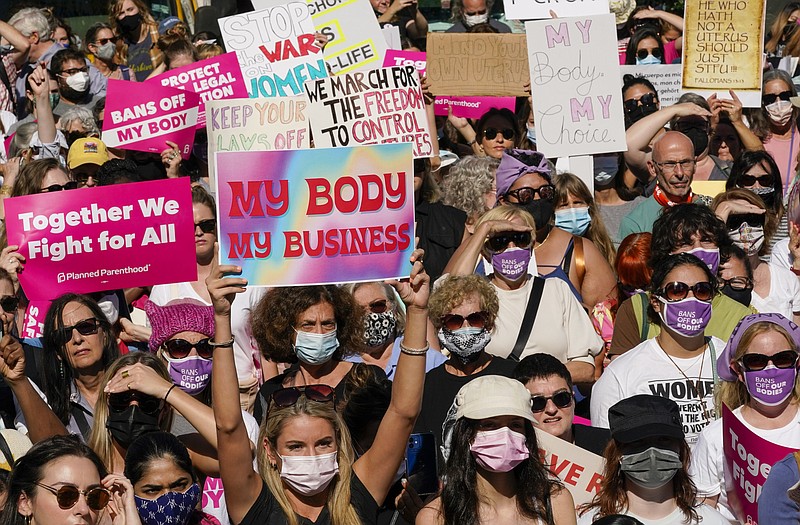WASHINGTON -- The Biden administration on Monday reversed a ban on abortion referrals by family planning clinics, lifting a Trump administration restriction as political and legal battles over abortion grow sharper from Texas to the U.S. Supreme Court.
The Department of Health and Human Services said its new regulation will restore the federal family planning program to the way it ran under the Obama administration, when clinics were able to refer women seeking abortions to a provider. The goal is to "strengthen and restore" services, said Health and Human Services Secretary Xavier Becerra.
Groups representing the clinics said they hope the Biden administration's action will lead some 1,300 local facilities that left in protest over Trump's policies to return, helping to stabilize a long-standing program shaken by the coronavirus pandemic on top of ideological battles.
[Video not showing up above? Click here to watch » https://www.youtube.com/watch?v=ozR4EgON-4g]
"I have heard that almost everywhere in the country people have made the decision that conditions will be good for them to return to the program," Clare Coleman, president of the umbrella group National Family Planning & Reproductive Health Association, said in an interview. "My sense is that people have been waiting for the rule."
Planned Parenthood, the biggest service provider, said on Twitter that its health centers look forward to returning. But the group criticized part of the Biden administration rule that allows individual clinicians who object to abortion not to provide referrals. The administration said that's "in accordance with applicable federal law."
Known as Title X, the taxpayer-funded program makes available more than $250 million a year to clinics to provide birth control and basic health care services mainly to low-income women, many of them from minority communities. Under former President Donald Trump, clinics were barred from referring patients for abortions, prompting a mass exit by service providers affiliated with Planned Parenthood, as well as several states and other independent organizations.
Critics of the Trump administration's rewrite of Title X policy -- mainly reproductive-rights advocates and other civil libertarians -- derided it as an "abortion gag rule" that constrained what doctors and other health practitioners could discuss with patients. But religious and social conservatives praised the policy for imposing a strict separation between family planning services and abortion. Under federal law, clinics could not use federal money to pay for abortions.
Rather than heeding the restrictions, affiliates of Planned Parenthood, which serve about four in 10 of the program's patients, as well as other health centers, forfeited the Title X funds that had been a main support of their work.
An estimated 981 clinics -- about one in four that received Title X money -- dropped out in 2019, and a half-dozen states no longer had any health centers in the program, according to the Guttmacher Institute, a reproductive-rights research and policy organization.
LAWSUITS
More than 20 states, which also receive some of the $286 million in family planning grants, filed federal lawsuits to try to prevent the restrictions from taking effect. Lower courts in Maryland and on the West Coast issued injunctions that blocked them temporarily. But in the summer of 2019, a California appeals court decided the Trump rule could begin while the litigation played out. And after giving protesting Title X participants two extra months to report their plans to comply with the rule, Trump health officials put it into effect.
In February 2020, the U.S. Court of Appeals for the 9th Circuit ruled in a divided decision in favor of the restrictions.
The upheaval may have led to more than 180,000 unintended pregnancies, the Health and Human Services Department said. In all, more than one-quarter of the clinics left the program. Although several states stepped up with their own no-strings-attached funding, women in some parts of the country still lost access.
Combined with service disruptions due to covid-19 shutdowns, "this has just been a massive one-two punch to the system," said Coleman.
Biden campaigned on a promise to overturn the restrictions on family planning clinics, but abortion was not a central issue in the 2020 presidential race. It may become one in the 2022 midterm elections to determine who controls Congress.
Restrictive state laws in Texas, Mississippi and elsewhere have prompted a mobilization by abortion-rights supporters, who fear the Supreme Court will overturn the 1973 Roe v. Wade decision that legalized abortion nationally. Hundreds of abortion-themed protests were held around the country Saturday, including one that brought thousands of abortion-rights supporters to the steps of the court.
A month ago, a divided Supreme Court said a new Texas law, which seeks to ban nearly all abortions as early as six weeks into a pregnancy, could go into effect while the statute's legality is fought out in the courts. The justices will hear arguments Dec. 1 on the Mississippi law, which bans most abortions after 15 weeks of pregnancy.
Twelve states have passed laws that would ban abortion entirely if Roe is overturned.
"Given the attacks on abortion in Texas and across the country, it's more important than ever that patients can access their choice of birth control and other health care through Title X," Planned Parenthood President Alexis McGill Johnson said in a statement.
The new abortion-referral policy for family planning clinics will take effect Nov. 8.
Information for this article was contributed by Ricardo Alonso-Zaldivar and David Crary of The Associated Press; and by Amy Goldstein of The Washington Post.



